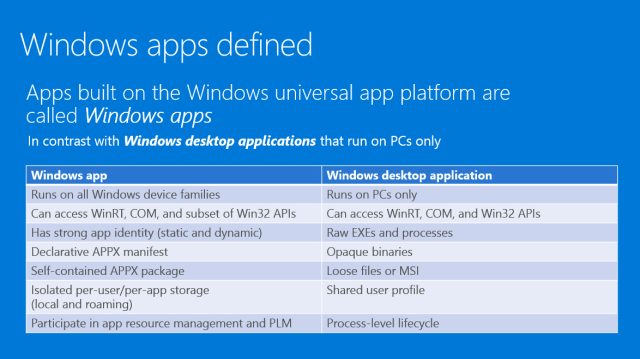
In the beginning there was the word, and the word was Metro. And then it was Windows 8-style. And then it was Modern. And then it was Windows Store. And then it was Universal. And today, Microsoft has decreed that henceforth these apps—which are all ultimately based on Windows Runtime—will be known as Windows apps.
Historically, of course, "Windows apps" (or "Windows programs") referred to standard, Win32-based executables that ran on the Windows desktop. Under the new naming scheme, these Win32 apps will now be called Windows desktop applications. As you can see in the slide above, despite the new nomenclature, the differences between the two types of app remain the same.
While the continued name changes are tiresome, they do make sense. I suspect Microsoft would've stuck with Metro if it hadn't fallen afoul of a trademark dispute, but none of the following names ever quite made sense. Modern was meaningless. Windows Store wasn't bad, but (at the time) it didn't encapsulate the fact that Microsoft was moving towards apps that worked across Windows, Windows Phone, and Xbox. Universal apps probably sounded OK in the marketing echo chamber, but it is unfortunately rather meaningless on its own—universal, but in what context? (Apple also referred to apps that ran natively on both Power PC and x86 processors in the early days of the transition to Intel processors as "Universal Applications.")
And so we arrive at Windows apps. Using "Universal Windows apps" might have mitigated much of the confusion/conflation with current Win32 apps—but given how Microsoft continues to treat Win32 like a vestigial, legacy limb, the new name isn't entirely surprising. Microsoft is still very eager for developers to create Windows apps (aka, Universal apps) rather than legacy Win32 apps. With Windows 10, the plan is to have phones, tablets, laptops, and desktops running the same Windows apps, so the new name does make sense in that regard.
The other thing to consider is that even if Microsoft wants us to call them Windows apps and Windows desktop apps, that doesn't mean the developer and user ecosystems will automatically make the switch. Here at the Ars Orbiting HQ for instance, it's not unusual to hear us still referring to Windows Runtime-based apps as Metro or Modern apps.

reader comments
178